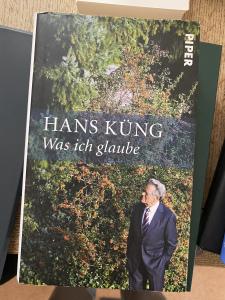This is the script of this morning’s Thought for the Day on the BBC Radio 4 Today programme:
Back in 2010 in Munich I attended a remarkable public conversation about the nature of the Church between two elderly academic theologians from Tübingen: the Protestant Jürgen Moltmann and Roman Catholic priest Hans Küng.
Küng died a few days ago at the age of 93, leaving behind him a long legacy of intellectual and spiritual enquiry. He wrote prolifically, always unafraid of truth and undaunted by the opposition he engendered within the Church hierarchy. His approach is probably best summed up when he realised as a child that he could swim “because the water’s supporting me”. What he called “the venture of faith” could not be proved theoretically by doing a course on dry land. In other words, commending or deriding the exercise of faith could not be done from any place of security, distant or removed from the experience of actually living it.
And this is where Küng found his courage and clarity. He not only dug deeply into theological themes, but also pursued, in conjunction with the world faiths, what a “global ethic” for the religions might look like. In 1993 he famously declared that there could be no peace among the nations without peace among the religions.
This is where Küng was remarkable. He refused to separate intellectual curiosity from the search for truth – both rooted in his passionate commitment to Jesus Christ. Although his persistent challenges led to his license to teach in the Roman Catholic faculty in Tübingen being removed, he continued in academia and in exercising his ministry as a priest. He once remarked to an interviewer that “I do not have many prejudices before starting, as I do not fear the outcome.”
This was evident in the conversation in Munich. Apart from teasing each other about things they had said in the past, they also agreed that Christians should be like human beings: eat and drink together first, then discuss theology afterwards. It is a nonsense to do it the other way round, they said.
And it is this that goes to the heart of Küng’s often controversial views. Mutual hospitality creates the context in which committed, curious, honest and intelligent conversation can emerge. Our common humanity is the starting point, rather than the evident points of difference.
Some people assume that religious people must live in two worlds: what their ‘church’ tells them to believe, and what they actually believe. Küng took Jesus seriously in denying the split. In 2009 he published ‘What I Believe’, demonstrating that nobody need fear the outcome of such rigorous and honest exploration. But, believing meant commitment, not just intellectual assent to a set of ideas.

